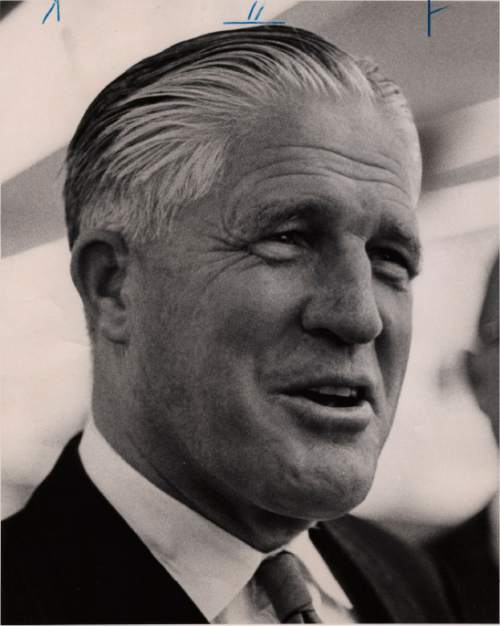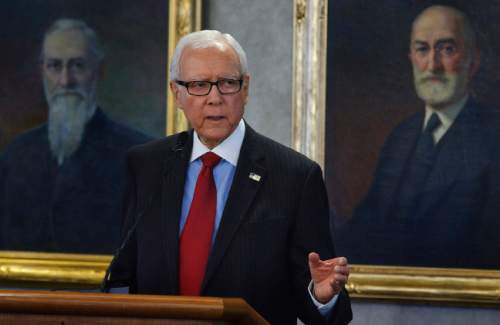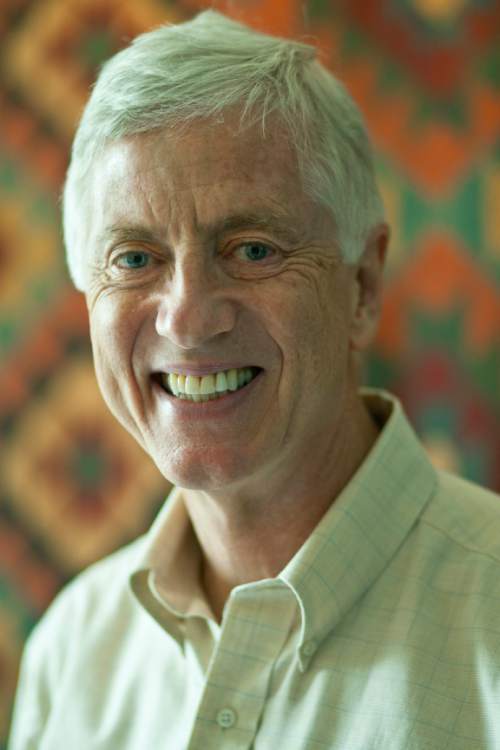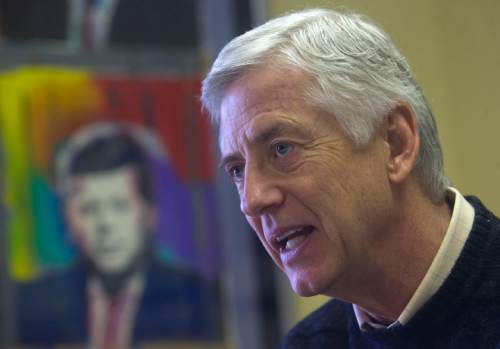This is an archived article that was published on sltrib.com in 2015, and information in the article may be outdated. It is provided only for personal research purposes and may not be reprinted.
Mitt Romney may not be running for president now, but two people who consider themselves former Mormons are — Republican Sen. Marco Rubio of Florida, and minor Democratic candidate Cody Judy.
That continues an LDS presence, of sorts, in presidential campaigns that has spanned 171 years with 10 fairly well-known Mormons (or former members).
They generally led a parade of spectacular failures, with one tantalizingly close run by GOP nominee Romney in 2012 — when he captured 47.2 percent of the popular vote and 206 electoral votes to President Barack Obama's 332, and finally managed a top-tier race by a Mormon in which religion was not a major obstacle.
Here's a look at some current and past Mormon (or ex-Mormon) candidates:
Marco Rubio • The current Republican candidate was baptized into The Church of Jesus Christ of Latter-day Saints at age 8 after his family had moved to Las Vegas. The Rubios moved next door to Mormons and were impressed by them and their help as neighbors.
"All in all, the Mormon church provided the sound moral structure my mother had wanted for us, and a circle of friends from stable, God-fearing families," Rubio wrote in his autobiography, "An American Son." "When we left the church a few years later, mostly at my instigation, we did so with gratitude for its considerable contribution to our happiness in those years."
While LDS values drew the Rubios to the faith, Rubio wrote that its ban on tobacco, alcohol and coffee made staying tough. He wrote that his father, who never joined the LDS Church, had smoked since age 13 and worked as a bartender — and the young Rubio chided him for such work. Neither parent gave up Cuban coffee.
Rubio later returned to Catholicism but also frequents Miami's Christ Fellowship, a Southern Baptist megachurch. He donated almost $50,000 to it and attended it almost exclusively from 2000 to 2004. Religion News Service says he now finds his spiritual home in Catholic churches in Washington and Florida.
The Washington Post noted last year that the LDS Church considers people who have been baptized still to be members, no matter how active they are, unless they formally ask for their names to be removed from Mormon records. Rubio apparently never did that.
So The Post notes that if Rubio wins, he would technically become the nation's first LDS president, the second Catholic president after John F. Kennedy and the first Republican Catholic president.
Cody Judy • The minor Democratic candidate is best known for a 1993 incident when then-apostle Howard W. Hunter (who later became president of the LDS Church) was speaking at Brigham Young University's Marriott Center. Judy rushed onto the rostrum and threatened Hunter and the audience.
He carried a briefcase that he claimed contained a bomb and held what appeared to be a detonator. He demanded that Hunter read a document that supposedly detailed God's plan for Judy to lead the church. Hunter refused.
When the audience spontaneously sang, "We Thank Thee, O God, for a Prophet," Judy reportedly became distracted and crowd members and security tackled him.
He was convicted of aggravated burglary and was sent to prison. Judy writes on his website that he "had to serve 3,018 days in prison as a religiously persecuted individual." He also writes that the LDS Church "kicked him out for apostasy."
He has made minor-candidate runs for Congress and the Senate in Utah, and also for U.S. president in 2008 and 2012.
Joseph Smith • Not only was he the first Mormon presidential candidate, he also was the first Mormon. He taught that Jesus Christ restored his church through him as a modern prophet.
He ran for president in 1844, largely to fight persecution that his followers suffered. Historian Richard Poll wrote that Smith likely developed the idea after LDS leaders wrote to other candidates asking how they might help the faith — and none supported the federal intervention that Mormons sought.
Missionaries traveled throughout the states and carried copies of Smith's platform. It called for ending slavery by compensating owners, financing the government through tariffs, creating a national bank and bringing Oregon and Texas into the union.
However, persecution in Illinois intensified. It led Smith's assassination by a mob in 1844. Mormons were forced out of Illinois in 1846 and migrated to remote Utah.
George Romney • The father of Mitt Romney was governor of Michigan and former head of American Motors Corp. when he became a leading Republican candidate for the White House in the early part of the 1968 race.
Some questions about religion arose, including whether being a Mormon made him racist because the LDS Church, at the time, did not ordain blacks to its all-male priesthood.
But Romney had a record of actively opposing segregation and prejudice in Detroit and was a promoter of civil rights. He told a ministerial association, "If my church prevented me as a public official from doing those things for social justice that I thought right, I would quit the church. But it does not."
What doomed his campaign, historians say, was his response to why he had changed his earlier strong support for the Vietnam War. He said military officials earlier had given him "the greatest brainwashing that anybody can get." He was lambasted for what many said was an inept explanation.
He withdrew from the race Feb. 28, 1968. He finished sixth at the GOP convention with 50 votes (44 from Michigan and six from Utah). Eventual winner Richard Nixon later named Romney as secretary of housing and urban development.
Morris Udall • The witty, liberal Democrat from Arizona, who was a former pro basketball player, ran for president in 1976. He had not been an active Mormon since he was a teenager, but the question of blacks and the LDS priesthood hurt him anyway.
Udall (who lost an eye as a child) would joke about his chances during the campaign by saying: "I'm a one-eyed Mormon Democrat from conservative Arizona. You can't find a higher handicap than that."
When he appeared to be gaining ground on Jimmy Carter in a critical Michigan primary, Detroit Mayor Coleman Young famously told black ministers that while Carter had tried to open the front doors of the church to blacks, Udall's church "won't even let you in the back door." Ironically, Carter's church, at the time, didn't let in black members while Udall's LDS faith allowed blacks to attend worship services.
Udall lost the Michigan primary by three-tenths of a percentage point, and Carter went on to ultimate victory.
Bo Gritz • He was an outspoken former Green Beret colonel and a recent LDS convert when he became the nominee of the minor Populist Party in 1992.
He gained national attention by helping negotiate an end to an 11-day standoff in northern Idaho between federal agents and white separatist Randy Weaver.
He received about 100,000 votes nationally, about 1 percent of the vote (the most of any Mormon presidential candidate in a general election until Mitt Romney in 2012).
Two years later, Gritz announced that he had asked the LDS Church to remove his name from its membership rolls. He said that came after his stake president — a regional lay leader — refused to renew his temple recommend because Gritz did not plan to file an income-tax return.
Orrin Hatch • The longtime Utah senator made a short-lived run for president in 2000, but he entered the race late and never made it into the top GOP tier.
He finished last in the first-in-the-nation Iowa caucuses and dropped out.
He delayed the announcement for a day because a snowstorm closed the Capitol in Washington. He joked at the time, "I said to Elaine [his wife], 'Maybe I shouldn't resign because this snowstorm is a sign from God.' And Elaine responded, 'No, Orrin. The Iowa caucuses were a sign from God.' "
Rocky Anderson • The former Salt Lake City mayor ran as the nominee of the new Justice Party in 2012.
He was baptized LDS as a youth, but was not an active Mormon as an adult — and listed himself as Episcopalian when he was a mayoral candidate.
Anderson said his minor-party candidacy was "about taking on the two corporatist, militarist parties."
He received 43,018 votes, for 0.03 percent of the vote.
Jon Huntsman Jr. • The former Utah governor and ambassador to China and Singapore ran as a moderate Republican for president in 2012 against Mitt Romney and other conservatives.
He also ran as the sort of Mormon who he said is "tough to define." He told an interviewer, "I come from a long line of saloon keepers and proselytizers, and I draw from both sides."
Huntsman — whose maternal grandfather, David B. Haight, was an LDS apostle — was reported to sip wine and church-hop among many denominations.
His moderate political messages did not play well in early GOP campaigning. He finished third in the New Hampshire primary, where he had targeted most of his resources, and dropped out Jan. 16.
Mitt Romney • The former Massachusetts governor and head of the 2002 Salt Lake City Winter Olympics was by far the most successful of any Mormon presidential candidate — winning the party's 2012 nomination, but losing to Democrat Barack Obama.
That came after he had run unsuccessfully in 2008. Because of attacks then, he had to address concerns about Mormonism in a John F. Kennedy-style speech.
"Let me assure you that no authorities of my church, or any other church, for that matter, will ever exert influence on presidential decisions," he said at the George H.W. Bush Presidential Library.
In 2008, Romney — a former LDS stake president and bishop — won 11 state primaries or caucuses, but dropped out two days after the Super Tuesday primaries showed John McCain would be the eventual nominee.
Romney ran as the GOP front-runner in 2012, and Mormonism figured little into that campaign.
What appeared to hurt him deeply against Obama was a video in which he told supporters, "There are 47 percent of the people who will vote for the president no matter what … who are dependent upon government, who believe that they are victims. … These are people who pay no income tax … and so my job is not to worry about those people."
Romney flirted with the idea of running for president again this year. He decided against a third bid in January, even though he said he believed he could win the GOP nomination.
He said another candidate would "emerge as being better able to defeat the Democrat nominee." 10 Mormon, or former Mormon, presidential candidates
Joseph Smith, 1844 • Sought to ease persecution of his church, but was murdered by a mob.
George Romney, 1968 • Once a GOP front-runner; quote about his "brainwashing" over Vietnam sank his campaign.
Morris Udall, 1976 • Liberal Democrat was hurt by attacks about LDS Church not allowing black males to hold the faith's priesthood.
Bo Gritz, 1992 • Former Green Beret colonel was colorful third-party candidate. Later left LDS Church.
Orrin Hatch, 2000 • GOP Utah senator was doomed by late campaign start and public mistrust of LDS religion.
Rocky Anderson, 2012 • Former Salt Lake City mayor, no longer considering himself a Mormon, ran third-party campaign.
Jon Huntsman Jr., 2012 • Former Utah governor and ambassador unsuccessfully ran as moderate in a conservative field.
Mitt Romney, 2008 and 2012 • Republican nominee in 2012, but lost close race to Democrat Barack Obama.
Cody Judy, 2008, 2012, 2016 • Ex-Mormon who once attacked a Mormon apostle at BYU is running as minor Democratic candidate.
Marco Rubio, 2016 • Florida senator who no longer considers himself a Mormon is seeking Republican nomination.









